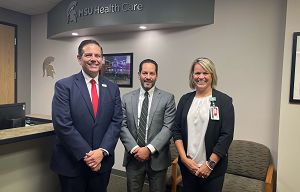Henry Ford Health Takes White House Pledge to Reduce Carbon Emissions

(THE WHITE HOUSE) – Henry Ford Health joined industry colleagues at the White House Thursday for a sector-wide display of commitment to reducing carbon emissions.
Attendees pledged to reduce greenhouse gas emissions by 50 percent by 2030 and achieve net zero emissions by 2050, goals outlined by the Biden Administration and the U.S. Department of Health and Human Services.
Vice President of Facilities and Support Services Gene Barber attended the event on behalf of Henry Ford along with leaders from organizations representing hundreds of hospitals and health centers, pharmaceutical companies, medical device-makers, suppliers and group purchasing organizations.
The pledge amplifies Henry Ford’s ongoing commitment to sustainability.
In October 2021, Henry Ford signed an agreement with DTE Energy to begin purchasing wind and solar energy. The goal is that beginning in 2023, 10% (approximately 19,100 megawatt hours) of Henry Ford’s total electricity purchased from DTE will come from Michigan-made renewable energy, increasing incrementally to 100% by 2029.
The system has been working with DTE and other partners to implement other energy conservation measures, like lighting replacement and HVAC upgrades, that are yielding significant reductions in greenhouse gas emission. Henry Ford is also working with other utility providers to identify further energy savings opportunities, including renewable energy options.
“We are deeply committed to the health of our communities and dedicated to sustainable solutions that improve health and wellness,” said Chip Amoe, Henry Ford’s Director of System Sustainability. “Our sustainability initiatives are designed to have a direct impact on improving the health of the employees, patients and communities we serve.”
In September 2021, 200 medical journals named climate change the number one threat to global public health. Millions of people living in the United States already experience associated harm—with disproportionate impacts on disadvantaged and underserved communities—through more frequent and intense periods of extreme heat, wildfires, flooding, vector-borne disease and other factors that worsen chronic health conditions.
The health care sector accounts for approximately 8.5 percent of U.S. domestic climate-warming emissions. The Office of Climate Change and Health Equity (OCCHE), part of HHS under the Assistant Secretary for Health, developed the health sector climate pledge in conjunction with the White House to help focus industry response to climate change. In addition to reducing their carbon footprint, signatories also commit to producing detailed plans to build climate resilience for their facilities and the communities they serve.
“Public health decisions have to be based on the realities of climate change, and we all need to do more to make that happen at the national level,” said ADM Rachel Levine, the Assistant Secretary for Health. “We’re seeing right now what extreme temperatures and more severe storms can do to human health, environmental quality and our physical infrastructure. It’s great to see so many different companies and organizations come together to decarbonize and become partners in protecting human health from climate change. Today’s announcement is just the beginning of a longer ongoing effort with partners from across the medical sector, which is exactly the kind of big response we need as a country.”
###
About Henry Ford Health
Serving communities across Michigan and beyond, Henry Ford Health is committed to partnering with patients and members along their entire health journey. Henry Ford Health provides a full continuum of services – from primary and preventative care, to complex and specialty care, health insurance, a full suite of home health offerings, virtual care, pharmacy, eye care and other healthcare retail.
It is one of the nation’s leading academic medical centers, recognized for clinical excellence in cancer care, cardiology and cardiovascular surgery, neurology and neurosurgery, orthopedics and sports medicine, and multi-organ transplants. Consistently ranked among the top five NIH-funded institutions in Michigan, Henry Ford Health engages in more than 2,000 research projects annually. Equally committed to educating the next generation of health professionals, Henry Ford Health trains more than 4,000 medical students, residents and fellows every year across 50+ accredited programs.
With more than 33,000 valued team members, Henry Ford Health is also among Michigan’s largest and most diverse employers, including nearly 6,000 physicians and researchers from the Henry Ford Medical Group, Henry Ford Physician Network and Jackson Health Network.
The health system is led by President and CEO Robert G. Riney and serves a growing number of customers across 250+ locations throughout Michigan including five acute care hospitals, two destination facilities for complex cancer and orthopedics and sports medicine care, three behavioral health facilities, primary care and urgent care centers.
About the Office of Climate Change and Health Equity
The Office of Climate Change and Health Equity (OCCHE) plays a vital role in protecting the nation’s health from climate change-related risks, including extreme heat, natural disasters, vector-borne diseases and more. OCCHE is looking forward to providing technical supports to companies that wish to reduce their environmental impact and become more resilient to the impacts of climate change, setting national health goals and objectives and supporting programs, services, and education activities that improve the health of all Americans. OCCHE is part of the Office of the Assistant Secretary for Health (OASH) within the U.S. Department of Health and Human Services. To learn more about OCCHE visit https://www.hhs.gov/ash/ocche/index.html.
.svg?iar=0&hash=F6049510E33E4E6D8196C26CCC0A64A4)

/hfh-logo-main--white.svg?iar=0&hash=ED491CBFADFB7670FAE94559C98D7798)








